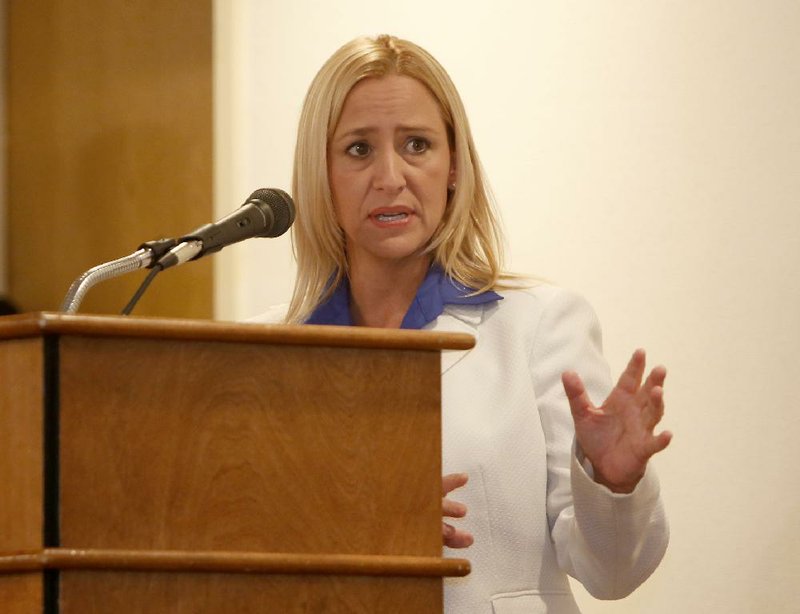Arkansas Attorney General Leslie Rutledge announced Wednesday that she will seek help from the nation's highest court in determining the constitutionality of the state's defunct 12-week abortion ban.
On Wednesday, Rutledge, a first-term Republican, said that in the coming weeks her office will file a petition for a writ of certiorari with the U.S. Supreme Court in an effort to uphold the Arkansas Human Heartbeat Protection Act, ruled unconstitutional by two lower federal courts.
"As Attorney General, I have a duty to fully defend the State's law, which prohibits abortions after 12 weeks of gestation when a heartbeat is detected," Rutledge said in her announcement. "But beyond my duty, I firmly believe that the State has a profound interest in protecting the lives of the unborn, which is exactly what this law does."
A writ of certiorari is an application for a review with the high court. Arkansas is not entitled to a review, and the U.S. Supreme Court gets about 7,000 writs from across the country and usually only accepts about 100 to 150 a year, according to Supreme Court aides.
Rita Sklar, director of the Arkansas chapter of the American Civil Liberties Union, said she wasn't surprised by Rutledge's plan to take the 2-year-old law to the high court in the nation's capital. But she doubts it will get there.
The ACLU was one of the first to challenge the 12-week abortion ban in 2013.
"We thought this was a possibility given the fact that this state's governor wants to make it very clear that he would like to overturn Roe v. Wade, to overrule what has been recognized as a constitutional right for the last 40 years, a woman's right to make her own personal private health care decision," Sklar said. "Frankly, I don't see the women of America standing for it."
Lawmakers passed what would become Act 301 of 2013 that March and were able to override a veto by former Democratic Gov. Mike Beebe, who felt the bill -- which would ban abortions after 12 weeks except in instances of rape, incest or health risks to the mother -- was unconstitutional.
Before the law went into effect in August 2013, the ACLU and the Center for Reproductive Rights supported a pair of doctors who challenged Act 301 in federal court that April.
U.S. District Judge Susan Webber Wright put an injunction on the law. That became permanent in March 2014, when she ruled that the law was unconstitutional.
Wright's ruling struck down the 12-week limit by finding that it cut against the legal precedent that allows for abortions until a fetus is viable, or capable of living outside the womb.
In 1973, the U.S. Supreme Court ruled in a landmark case, Roe v. Wade, that abortion was a constitutional right so long as the fetus wasn't viable.
Typically, a fetus is viable at 24 to 28 weeks. Before the passage of Act 301, Arkansas law allowed abortion until the 25th week of a pregnancy.
The state appealed Wright's ruling, and on May 27 of this year, a three-judge panel upheld Wright's ruling, saying the state failed to show any evidence that fetal viability was possible at 12 weeks.
Rutledge's office asked for a rehearing with the U.S. Eighth Circuit Court of Appeals. The court denied the request in July.
Rutledge spokesman Judd Deere said Rutledge's office has not submitted the petition yet and that a copy wouldn't be available for several weeks.
John DiPippa, dean emeritus at the University of Arkansas at Little Rock's William H. Bowen School of Law, said Rutledge's plans are a long shot.
Then again, he said, the state may as well try.
"They will be swinging for the fences here," DiPippa said. "The truth is, the state has nothing to lose. They get turned down, then they're in the same position they are today. If they get it granted, they could be potentially on the verge of a historic decision."'
Act 301, DiPippa said, was unconstitutional under case law when it was crafted, a fact that played out in Wright's courtroom and in the federal appeals court. Similar bans have also failed in other courts across the country, DiPippa said, but those courts were following a precedent from the Supreme Court.
DiPippa said there is a movement by several states to try to force the abortion debate before the U.S. Supreme Court by "test cases" like Act 301.
"It's not unusual to have test cases get to the Supreme Court. What's unusual is they're often developed by private activist groups," DiPippa said. "But the pattern here is states are self-consciously trying to create test case litigation ... this [writ] is just the next step in the plan."
Sklar said she doubts the court will pick up the Arkansas challenge because of the court's decision not to revisit an appeal by Arizona, which saw its own 20-week abortion ban invalidated by a federal judge.
"If they wouldn't hear that, it's hard to imagine they'd hear this one," Sklar said. "I want people to understand that there are people in this country determined to overturn Roe v. Wade, determined to take away a woman's control over their personal health care decisions, that it is not safe to give up this struggle."
DiPippa said he couldn't speculate as to whether the court would review it, but he said that if the court favors the review, supporters of the 12-week ban should be encouraged.
"I don't think justices who want to overturn Roe would bring this up unless they were pretty sure they had a fifth vote. If you bring it up and lose, you'd have a bad precedent standing in your way," DiPippa said. "If they grant [the writ], I think it means they may have a fifth vote locked up."
Metro on 09/24/2015

